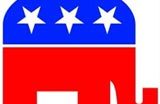So many memories, particularly of the years as neighbours on Rosemount Avenue, with shared activities, adventures and lively political discussions.…
North Korea 2010-16
Written by Diana Thebaud Nicholson // September 9, 2016 // Asia // Comments Off on North Korea 2010-16
The Guardian: North Korea
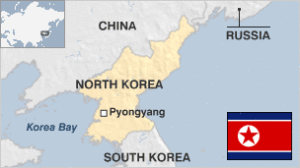 North Korea profile
North Korea profile
Politics: A family dynasty heads a secretive, communist regime which tolerates no dissent
Economy: North Korea’s command economy is dilapidated, hit by natural disasters, poor planning and a failure to modernise
International: The armistice of 1953 ended armed conflict on the Korean peninsular, but the two Koreas are technically still at war; tensions have been exacerbated in recent decades by North Korea’s nuclear ambitions (BBC)
2016
Richard Haass: The Coming Confrontation with North Korea
Imagine it is 2020. The director of the CIA requests an urgent meeting with the US president. The reason: North Korea has succeeded in making a nuclear bomb small enough to fit inside the tip of an intercontinental ballistic missile capable of reaching the continental United States. The news soon leaks to the public. High-level meetings to devise a response are held not just in Washington, but in Seoul, Tokyo, Beijing, and Moscow as well.
This scenario may seem unreal today, but it is more political science than science fiction. North Korea just carried out its fifth (and apparently successful) test of a nuclear explosive device, doing so just days after testing several ballistic missiles. Absent a major intervention, it is only a matter of time before North Korea increases its nuclear arsenal (now estimated at 8-12 devices) and figures out how to miniaturize its weapons for delivery by missiles of increasing range and accuracy.
It is difficult to overstate the risks were North Korea, the world’s most militarized and closed society, to cross this threshold. (Project Syndicate September 2016)
9 September
Global condemnation for North Korea nuclear test, sanctions threatened
(Reuters) North Korea conducted its fifth and biggest nuclear test on Friday and said it had mastered the ability to mount a warhead on a ballistic missile, ratcheting up a threat that rivals and the United Nations have been powerless to contain.
The United Nations Security Council was set to discuss the latest test and whether the 15-member body should punish North Korea with more sanctions at a meeting on Friday, diplomats said.
urged the 15-member group to remain united and take action that would “urgently break this accelerating spiral of escalation.”
U.S. President Barack Obama said after speaking by telephone with South Korean President Park Geun-hye and with Japanese Prime Minister Shinzo Abe, that they had agreed to work with the Security Council and other powers to vigorously enforce existing measures against North Korea and to take “additional significant steps, including new sanctions.”
India Can’t Ignore Rawalpindi-Pyongyang Nexus’ Nuclear Threat
(The Quint) There are many complex regional and global implications of the latest North Korean nuclear test (the first credible nuclear explosion was conducted in October 2006) that involve the major regional powers — the US, China, Russia, Japan and South Korea — and their bi-lateral and multilateral relations.
Some of these strands have a relevance for India, particularly in relation to how Japan and South Korea now perceive their own WMD (weapons of mass destruction) security and the degree to which they feel that the US nuclear umbrella is adequate to assuage the insecurity that a nuclear Pyongyang induces.
Timeline: North Korea’s nuclear weapons development
Pyongyang is suspected of having detonated a 5th nuclear device at a test site in the north east of the country. This is how it got to this stage
30 August
North Korea executes officials with anti-aircraft gun in new purge – report
Two senior regime officers reported to have been killed for posing a threat to leader Kim Jong-un
Hwang was reportedly killed for making policy proposals that were seen as a direct threat to Kim’s leadership. The report did not give details of the proposals. Ri was said to have been executed for falling asleep during a meeting chaired by Kim.
19 July
North Korea launches three more ballistic missiles
Latest launches come a week after South Korea and US revealed plans to deploy Thaad missile defence shield
North Korea launched three ballistic missiles into the sea on Tuesday, South Korean have said.
The missiles, presumed to be Scud-types, were launched from North Hwanghae province and travelled for up to 600km (370 miles), South Korean news agency Yonhap quoted the military as saying. The range is enough to reach all of South Korea, South Korea’s Joint Chiefs of Staff said
6 July
Kim Jong-un placed on sanctions blacklist for the first time by US
Ten top North Korean officials also blacklisted for widespread human rights abuses, including extrajudicial killings, forced labor and torture, US said
According to officials in Washington, the ministry of state security holds 80,000 to 120,000 prisoners in political prison camps where torture, execution, sexual assault, starvation and slave labor are common.
Meanwhile, the ministry of people’s security overseen by Kim runs a network of police stations, detention centers and labor camps where suspects under interrogation “are systematically degraded, intimidated and tortured”, the United States said.
Kim is “rather plainly ultimately responsible for the actions of his regime including its repressive policies”, a senior US official said, speaking anonymously.
But authorities in Washington for the first time identified other top officials directly involved in rights abuses, including Choe Pu Il, the minister of people’s security, Ri Song Chol, a senior official in the minister of people’s security, and Kang Song Nam, a bureau director with the ministry of state security.
18 May
Donald Trump says he is open to talks with North Korea’s Kim Jong-un
Republican presidential candidate Donald Trump said he was willing to talk to North Korean leader Kim Jong-un to try to stop Pyongyang’s nuclear program, proposing a major shift in US policy toward the isolated nation.
North Korea’s mission to the United Nations did not immediately respond to a request for comment on Trump’s remarks.
Trump also said he would press China, Pyongyang’s only major diplomatic and economic supporter, to help find a solution.
8 May
Kim Jong-un: the tyrant’s son who wants to be loved and feared
By Simon Tisdall
(The Observer) North Korea’s ruling party meets this weekend for the first time in 36 years. Will the congress show the young leader as the supreme head of a nuclear power, or merely reveal his insecurities?
… one of the most chilling tales about Kim is also largely unsubstantiated: how the young dictator, having inherited power and determined to be his own man, deliberately set about eliminating the senior apparatchiks who had grown rich and powerful under the tutelage of his late father, Kim Jong-il.
As if unwitting actors in a devious, internecine plot from a Godfather movie, the pall-bearers who carried the elder Kim’s coffin during an elaborate state funeral ceremony in the capital in December 2011 have disappeared, died of unknown causes, or been purposefully eliminated, one by one, in the past five years.
7 March
(Quartz) North Korea was as gentle as always with the rhetoric. The Hermit Kingdom said it would turn Washington and Seoul into “flames and ashes” with a “pre-emptive nuclear strike of justice.” The statement is a reaction to joint military drills by the US and South Korea, which started today and continue through April.
9 February
Security Council condemns N. Korea rocket launch
The United Nations Security Council held an emergency session following North Korea’s launch of a long-range rocket. The Security Council condemned the launch, saying it contravenes existing UN sanctions. It also pledged to issue fresh sanctions. BBC (2/8)
U.S. urges China to increase sanctions pressure on North Korea
(Reuters) China agrees any new U.N. resolution on North Korea will include additional sanctions and go beyond previous steps, but Washington is urging Beijing to put even more pressure on Pyongyang after its recent nuclear test and rocket launch, a senior U.S. official said on Monday.
China is in “unique position” as North Korea’s neighbor and ally to compel it to abandon its nuclear weapons and ballistic missile programs, the official told Reuters, as U.N. diplomats sought to craft a new sanctions resolution.
“It’s clear to me that our Chinese friends have indicated that the U.N. Security Council’s response will include sanctions and does need to go beyond previous resolutions,” he said.
North Korea fired a rocket. Pyongyang launched the rocket, which may have violated Japanese airspace, on Sunday morning, prompting the UN Security Council to threaten fresh sanctions. China tried to persuade North Korea not to provoke its neighbors, but it launched the rocket on a major Chinese holiday.
6 January
The most recent and worrisome development was Tuesday’s news from The Hermit Kingdom that it had detonated a hydrogen bomb, after conducting a fourth nuclear test. According to the BBC “Experts believed before the fourth test that North Korea was still some years from being able to hit a target with a nuclear bomb delivered by a missile. But it is crystal clear that it is absolutely determined to be able to do so. It is also clear that it is improving its abilities rapidly.” Not a happy prospect.
2015
12 February
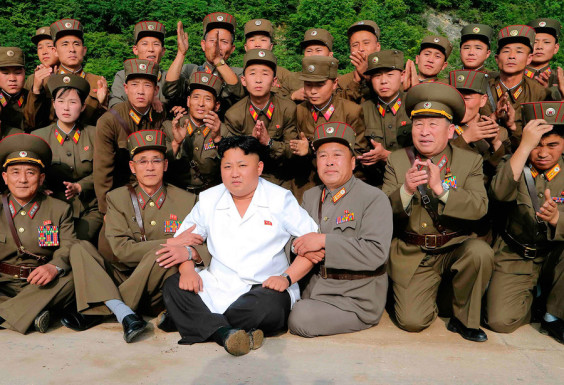
Understanding Kim Jong Un, The World’s Most Enigmatic and Unpredictable Dictator
Everyone knows that North Korea’s leader is a bloodthirsty madman and buffoon—or is he really? Mark Bowden digs into the hard facts for an unusual portrait.
(Vanity Fair) Does anyone make an easier target than Kim Jong Un? He’s Fatboy Kim the Third, the North Korean tyrant with a Fred Flintstone haircut—the grinning, chain-smoking owner of his own small nuclear arsenal, brutal warden to about 120,000 political prisoners, and effectively one of the last pure hereditary absolute monarchs on the planet. He is the Marshal of the Democratic People’s Republic of Korea, the Great Successor, and the Sun of the 21st Century. At age 32 the Supreme Leader owns the longest list of excessive honorifics anywhere, every one of them unearned. He is the youngest head of state in the world and probably the most spoiled. On the great grade-school playground of foreign affairs, he might as well be wearing across his broad bottom a big KICK ME sign. Kim is so easy to kick that the United Nations, which famously agrees on nothing, voted overwhelmingly in November to recommend that he and the rest of North Korea’s leadership be hauled before the International Criminal Court, in The Hague, and tried for crimes against humanity. He has been in power for a little more than three years. …
Whatever his true character, Kim faces a problem peculiar to dictators. His power in North Korea is so great that not only does no one dare criticize him, no one dares advise him. If you are too closely associated with the king, your head might someday share the same chopping block. Safer to adopt a “Yes, Marshal” approach. That way, if the king stumbles, you are simply among the countless legion who were obliged to obey his orders. One way to read the confusing signals from Pyongyang in recent years is that they show Kim, isolated and inexperienced, clumsily pulling at the levers of state.
2014
29 December
S Korea, Japan and US to share info on North
Seoul and Tokyo to share intelligence via Washington on N Korea’s missile and nuclear programmes as part of a new pact.
Meanwhile, South Korea proposed on Monday to resume stalled talks with North Korea, hoping to hold negotiations in January to cover issues including reunions for families separated by the 1950-53 Korean war, and possible cooperation projects.
North Korea sent female agents to sleep with foreign dignitaries, then blackmailed them, former insider alleges
In a scheme called “the seed-bearing programme,” high-level foreign visitors to Pyongyang would be sent an attractive consort, only to find out several months later that they had conceived a child.
They would then be blackmailed. Journalists would be asked to write positive stories and businessmen urged to set up joint ventures with local companies. … the children were brought up fiercely loyal to the regime and, with looks that were a combination of cultures, could be infiltrated into other countries as agents.
24 December
It’s OK if you don’t watch The Interview on Christmas, or ever
In defense of our right as Americans to ignore a dumb movie
23 December
The ‘I’m so ronery’ jokes mask the real evil of North Korea
The horror of a recent UN report on North Korea punctures the quirky Kim Jong-il and Kim Jong-un representations of Team America and The Interview for good
(The Guardian) North Korea isn’t funny. Yes, it’s bizarre, fantastical, unlikely, outlandish. The state news agency, KCNA, carries a stream of absurd praise for the three Kims, all the way to reports of spontaneous natural miracles in their honour. But this is all underpinned by tragedy on an unimaginable scale.
The near religious personality cult surrounding the Kims is central to an all-encompassing system of indoctrination. It’s not amusing. It’s a manifestation of a truly horrible mindset that keeps 25 million people in virtual slavery. Deviate in any way from the official doctrine and you and your family, even your descendants, can end up inside North Korea’s vast, secretive and unimaginably horrible network of prison camps.
The UN report on the human rights situation in North Korea earlier this year contained almost unreadable details of life for the estimated 80,000-120,000 political prisoners. One former inmate told the panel his duties involved burning the bodies of those who had starved to death and using the remains as fertiliser. Another watched a female prisoner forced by guards to drown her newborn baby in a bucket because it was presumed to have a Chinese father.
22 December
A Lot of Smart People Think North Korea Didn’t Hack Sony
The evidence linking agents of the Democratic People’s Republic of Korea to the recent digital implosion of Sony remains vague. And even though the feds are squarely blaming North Korea, many security experts aren’t buying it.
North Korea’s internet appears to be under mass cyber attack
Internet connectivity between North Korea and the outside world, though never robust to begin with, is currently suffering one of its worst outages in recent memory, suggesting that the country may be enduring a mass cyber attack a few days after President Obama warned the US would launch a “proportional response” to North Korea’s hack against Sony.
… While it’s entirely possible that this is due to run-of-the-mill maintenance or technical issues, it’s hard to miss that the outage comes just days after President Obama condemned North Korea as responsible for the massive cyberattack against Sony and pledged a “proportional” US response. Two other cybersecurity firms confirmed to the New York Times that North Korea’s is collapsing amid an apparent cyber attack.
The outage also comes as China is investigating the accusations against North Korea over the Sony hack. North Korea’s internet access is wired through China, which gives China more or less direct control over North Korea’s access to the outside world.
27 November
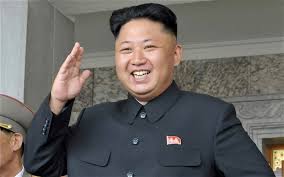 Kim Jong-un: beyond the personality cult
Kim Jong-un: beyond the personality cult
From a lonely young boy to a third generation tyrant who went on to execute his own family members
North Korean leader Kim Jong-un is coming under increased scrutiny amid claims of crimes against humanity in the country and as his regime pushes ahead with its nuclear programme. But the life of the ‘Great Successor’ remains shrouded in mystery.
Worshipped and feared in equal measure at home, criticised and ridiculed abroad – what do we know about one of the world’s most secretive leaders?
28 October
Mystery Of Kim Jong Un’s Disappearance May Be Solved
(AP) — South Korea’s spy agency believes it has solved the mystery of North Korean leader Kim Jong Un’s 6-week public absence that set off a frenzy of global speculation, a lawmaker who attended the agency’s closed-door briefing said Wednesday.
The National Intelligence Service told legislators Tuesday that a foreign doctor operated on Kim in September or October to remove a cyst from his left ankle, lawmaker Shin Kyung-min said. He said the spy agency also told lawmakers that the cyst could recur because of Kim’s obesity, smoking and heavy public schedule.
After last being seen in state media on Sept. 3, Kim reappeared on Oct. 14 hobbling with a cane, but smiling and looking thinner. The speculation during his absence was particularly intense because of the Kim family’s importance to the country locked in a long-running international standoff over its nuclear and missile programs. …
The agency also told the lawmakers that North Korea has expanded one of its five political prisoner camps in the country. The agency said it believes authorities are relocating inmates held in the Yodok camp, northeast of Pyongyang, to the expanded camp in the northeastern town of Kilju, according to Shin’s office.
Shin said the agency also believes that North Korea recently used a firing squad to execute several people who had been close to Kim Jong Un’s uncle, Jang Song Thaek, who was considered the country’s No. 2 power before his sudden purge and execution in December 2013.
13 July
North Korea fires missiles into sea in apparent anger over military drill
Two short-range ballistic missiles are fired into East Sea overnight as South Korea and US prepare for joint exercise
11 July
How South Korea and America wrecked chance for reconciliation with the North
As North Korea commemorates 20th anniversary of death of Kim Il-sung, Mark Barry reflects on a costly missed opportunity
(The Guardian) North Korea’s founding father Kim Il-sung died suddenly 20 years ago this week – 17 days before what would have been the first inter-Korean summit. The weeks leading up to his death – and even his funeral – were rare moments of opportunity for reconciliation, missed by South Korea and the US.
14 February
Crimes Against Humanity Committed In North Korea, UN Panel Finds
(AP) — A U.N. Commission of Inquiry has found that crimes against humanity have been committed in North Korea and recommends that its findings be referred to the International Criminal Court, two people familiar with the commission’s report have told The Associated Press.
The commission, which conducted a yearlong investigation, has found evidence of an array of such crimes, including “extermination,” crimes against humanity against starving populations and a widespread campaign of abductions of individuals in South Korea and Japan.
Its report, due for release Monday, does not examine in detail individual responsibility for the alleged crimes but recommends steps toward accountability.
13 February
Kerry Talks North Korean Denuclearization with Chinese Leaders
(Foreign Policy Morning Brief) U.S. Secretary of State John Kerry met with Chinese President Xi Jingping and other senior officials in Beijing today. The delegations discussed climate change, human rights, and the ongoing conflict in Syria, among other topics.
Following the talks, Secretary Kerry told reporters that Chinese officials had committed to taking further steps to achieve North Korean denuclearization, though he declined to elaborate on the specifics.
2013
11 September
Koreas Set Date for Reopening Shuttered Industrial Park
(VOA News) North and South Korea have agreed to reopen a jointly-run industrial park just inside the North Korean border on a trial basis starting next Monday.
The South’s Unification Ministry says negotiators reached the deal on the Kaesong industrial complex following lengthy negotiations that lasted through early Wednesday.
23 August
Koreas agree on talks to reunite families
North and South Korea are set to hold talks on reuniting families separated by the Korean War.
(Al Jazeera) The meetings were suspended three years ago.
Since then, ties between Seoul and Pyongyang have become worse.
But Friday’s talks are seen as a sign that tension is easing.
16 April
North Korea’s war threats may be aimed at stifling domestic discontent
North Koreans are becoming less afraid of their government and increasingly well-informed about the outside world
(The Guardian) North Korea is a remarkable country. How else would a small state with no economy to speak of manage to create a massive media panic and remain in the headlines for a couple of weeks in a row?
The question remains though: if Pyongyang is not about to launch a nuclear strike on the continental United States – and it clearly is not – what has it been up to for the past three weeks? One aim of this political theatrics is rather clear: the North Korean government wants to remind the world of its existence and demonstrate that it is cheaper to make a deal than sanction it. This time, however, there is good reason to believe that domestic considerations are also at work.
15 April
Jeffrey Sachs: A Better Approach Towards North Korea
If we act calmly and sensibly, we can easily defuse the current crisis. North Korea is looking for respect, not war. It’s time to talk, to lower the heat, and to avoid a confrontation or the imposition of impossible or humiliating demands. And we need to remember, if we are to induce good behavior among others, we will have to stop our bad habit of killing them afterward.
13 April
U.S., China agree to rid North Korea of nuclear weapons
(Globe & Mail) Bound by threats from North Korea, the U.S. and China agreed Saturday to rid the bellicose nation of nuclear weapons in a test of whether the world powers can shelve years of rivalry and discord, and unite in fostering global stability.
Beyond this latest attempt to restrain North Korea, the burgeoning nuclear crisis has so frustrated the U.S. and China that they are forming a new and tentative bond with the potential to carry over into areas that have vexed them for decades.
[US Secretary of State John] Kerry and the Chinese foreign policy chief, State Councilor Yang Jiechi, said the two nations would work together to create a nuclear-free Korean peninsula, effectively forcing North Korea to give up its arsenal.
Yang, through an interpreter, described China’s stance on North Korea as “clear cut” and called for resuming the six-nation talks that fell apart four years ago and are aimed at ending the nuclear threat. U.S. says agrees with China on peaceful North Korea solution
(Reuters) – The United States said on Saturday that China had agreed to help rid North Korea of its nuclear capability by peaceful means, but Beijing made no specific commitment in public to pressure its long-time ally to change its ways.
9 April
Ferocious, Weak and Crazy: The North Korean Strategy | Stratfor
North Korea has been using the threat of tests and the tests themselves as weapons against its neighbors and the United States for years. On the surface, threatening to test weapons does not appear particularly sensible. If the test fails, you look weak. If it succeeds, you look dangerous without actually having a deliverable weapon. And the closer you come to having a weapon, the more likely someone is to attack you so you don’t succeed in actually getting one. Developing a weapon in absolute secret would seem to make more sense. When the weapon is ready, you display it, and you have something solid to threaten enemies with.
North Korea, of course, has been doing this for years and doing it successfully, so what appears absurd on the surface quite obviously isn’t.
8 April
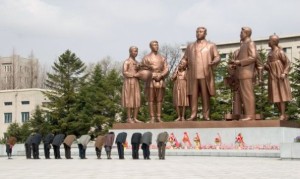 Venerating the Kims — Just one more religion?
Venerating the Kims — Just one more religion?
(The Economist) WHAT is the tenth most widely followed religion in the world? According to www.adherents.com, a site which gathers data on faith from many sources, that honour goes to juche, the national ideology of North Korea, which is credited with 19m followers. As the site’s editors explain, “from a sociological viewpoint, it is clearly a religion”. Juche is more obviously religious in character than either Soviet communism or Maoism. Thomas J Belke, an American Protestant theologian who has written a book about juche, agrees that it’s a religion. “It has a comprehensive belief system, holy places, distinctive customs…and it displaces other religions.”
It does not take a sociological genius to see that the cult of the North Korean state’s founder, Kim Il Sung, and of his son and successor Kim Jong Il, who ruled from 1994 to 2011, shares many features with established creeds. Images of the Kims, and their all-wise pronouncements, fill the sensory field of every North Korean, in a way that Christianity permeated daily life in medieval Europe or Byzantium. The founder is sometimes presented as a kind of god, and his successor as the “son of a god”—a formula that has echoes of Christian theology. If the latest member of the dynasty to take the helm, Kim Jong Un, has any legitimacy, it is as the grandson of one divine figure and son of another. The young scion is starting to accumulate laudatory titles of his own.
North Korea suspends last project with South, Putin cites Chernobyl
(Reuters) – North Korea suspended its sole remaining major project with the South on Monday, after weeks of threats against the United States and South Korea, as Russian President Vladimir Putin said any nuclear conflict could make Chernobyl look like a fairy tale.
North Korean nuclear test preparations suspected
South Korean government says there are signs the regime is getting ready for what would be its fourth nuclear weapon test
7 April
North Korea: experts call for dialogue – and say China must play a part
(The Guardian) Washington postpones planned missile test as Switzerland offers to act as mediator with Pyongyang
China wades into Korean peninsula tensions
President Xi speaks out over standoff as US delays intercontinental missile launch amid tension with North Korea.
(Al Jazeera) China has added its voice to the growing tensions in the Korean peninsula, saying no country should cause global chaos after the US postponed a missile test to ease war fears.
Xi Jinping, the president of China, North Korea’s financial and diplomatic backer, issued the veiled rebuke of its ally on Sunday after repeated threats from the North of a nuclear strike against the United States and South Korea and joint military training exercises between Pyongyang’s two enemies.
“No one should be allowed to throw a region, or even the whole world, into chaos for selfish gains,” Xi told a forum on the southern island of Hainan, without naming any specific country.
Xi’s comments came a day after North Korean authorities told diplomatic missions they could not guarantee their safety from next Wednesday, declaring that conflict was inevitable amid joint US-South Korean military exercises.
5 April
In North Korea, nine is the magic number
An analysis of the regime’s significant dates shows a dynasty of Kims obsessed with the number nine. Watch out on 10 April 13 (10-04-13) (The Guardian) – Nothing major happened
Wednesday Night’s Two Davids debate the importance of the North Korea threat:
David (Jones) North Korea: Military Maneuvers Indicate a Legitimate Threat
vs
David (Kilgour) North Korea’s posturing merely reflects the country’s crumbling status
4 April
U.S. to send missile defenses to Guam over North Korea threat
(Reuters) – The United States said it would soon send a missile defense system to Guam to defend it from North Korea, as the U.S. military adjusts to what Defense Secretary Chuck Hagel called a “real and clear danger” from Pyongyang. … North Korea also repeated its threat to launch a nuclear attack on the United States. Pyongyang said it had ratified a potential strike because of U.S. military deployments around the Korean peninsula that it claimed were a prelude to a possible nuclear attack on the North.
North Korea Twitter Account Hacked Amid Tension; Anonymous Allegedly Grabs Data
(HuffPost) North Korea opened its Twitter account in 2010. It has more than 13,000 followers. The North uses the social media to praise its system and leaders and also to repeat commentaries sent out by North’s official Korean Central News Agency.
1 April
The Next Korean War
Conflict With North Korea Could Go Nuclear — But Washington Can Reduce the Risk
(Foreign Affairs) Ironically, the risk of North Korean nuclear war stems not from weakness on the part of the United States and South Korea but from their strength. If war erupted, the North Korean army, short on training and armed with decrepit equipment, would prove no match for the U.S.–South Korean Combined Forces Command. Make no mistake, Seoul would suffer some damage, but a conventional war would be a rout, and CFC forces would quickly cross the border and head north.
At that point, North Korea’s inner circle would face a grave decision: how to avoid the terrible fates of such defeated leaders as Saddam Hussein and Muammar al-Qaddafi. Kim, his family, and his cronies could try to escape to China and plead for a comfortable, lifelong sanctuary there — an increasingly dim prospect given Beijing’s growing frustration with Kim’s regime. Pyongyang’s only other option would be to try to force a cease-fire by playing its only trump card: nuclear escalation.
Expert Sees High Likelihood of North Korean Attack
In an exclusive interview with LIGNET, North Korea expert Dr. Sung-Yoon Lee says current tensions with North Korea are so high that they are likely to result in some kind of North Korean attack or bombing, possibly within a few days. Dr. Lee also discusses why the West has had such difficulty in dealing with the North Korean regime and the policies that America should employ to deal with it. All Rights Reserved LIGNET.com
30 March
Pyongyang Blusters, and U.S. Worries About Quieter Risks
(NYT) This week, North Korea’s young leader, Kim Jung-un, ordered his underlings to prepare for a missile attack on the United States. He appeared at a command center in front of a wall map with the bold, unlikely title, “Plans to Attack the Mainland U.S.” Earlier in the month, his generals boasted of developing a “Korean-style” nuclear warhead that could be fitted atop a long-range missile.
… it is the abilities that Mr. Kim is not showing off that have the Obama administration most worried. The cyberattacks on South Korea’s banking system and television broadcasters two weeks ago were surprisingly successful, as was the torpedo attack three years ago this week on the Cheonan, a naval corvette, that killed 46 South Korean sailors. …
To North Korea experts in Washington and Seoul, there is something familiar in the country’s threats to “keep the White House in the cross hairs of our long-range missiles.” Such threat of armed brinkmanship … has in the past drawn its adversaries to the bargaining table with economic concessions. But at the same time, the tensions with the outside world provide the government with opportunities to elevate its leader’s status among his people.
21 March
A running list of North Korea’s near-daily threats
(Foreign Policy) If you’re having a hard time keeping track of the multitude of threats issued by North Korea in the last few weeks, you’re not alone: Kim Jong Un’s young regime is on a seemingly endless tear of warnings and provocations. From threats of a nuclear holocaust to artillery strikes near disputed borders, here are the latest shots across the bow from the Hermit Kingdom, beginning with those that followed international sanctions over Pyongyang’s third nuclear test in February
7 March
North Korea threatens nuclear strike, U.N. expands sanctions
(Reuters) – North Korea threatened the United States on Thursday with a preemptive nuclear strike, raising the level of rhetoric as the U.N. Security Council approved new sanctions against the reclusive country.
China’s U.N. Ambassador Li Baodong said Beijing wanted to see “full implementation” of the new Security Council resolution.
UN cracks down on North Korea, issues sanctions
The United Nations Security Council unanimously voted today to issue new sanctions against North Korea in retribution for that country’s third nuclear test. North Korea faces restrictions on financial instruments and shipments of certain cargo. The resolution “sent an unequivocal message to [North Korea] that the international community will not tolerate its pursuit of nuclear weapons,” says UN Secretary-General Ban Ki-moon. Reuters (3/7)
5 March
New U.N. sanctions to take aim at North Korean diplomats: U.S
(Reuters) – A draft U.N. Security Council sanctions resolution that Washington and Beijing have agreed on targets illicit activities by North Korean diplomats and Pyongyang’s banking relationships, U.S. envoy to the United Nations Susan Rice said on Tuesday.
“For the first time ever, this resolution targets the illicit activities of North Korean diplomatic personnel, North Korean banking relationships, (and) illicit transfers of bulk cash,” Rice said after a closed-door meeting of the 15-nation council.
Did Kim Jong-un and his wife have a baby?
(CSM) Speculation over the possibility of North Korea’s first couple having a child hit a high point in January, when South Korean media closely analyzed photos of Ri.
27 February
North Korea blames U.S. for tension on peninsula
(Reuters) – North Korea accused the United States on Wednesday of contributing to an “unpredictable” situation on the divided Korean peninsula and abusing its power in the U.N. Security Council to impose its “hostile policy” against Pyongyang.
North Korea is facing further United Nations sanctions for its underground nuclear test explosion two weeks ago, its biggest and most powerful to date which drew warnings from Washington and international condemnation.
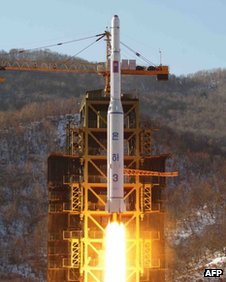 25 February
25 February
South Korea’s new president demands North drop nuclear ambitions
29 January
Analysis: What is driving North Korea’s nuclear test plan?
By Dr John Swenson-Wright, Chatham House
(BBC) Official announcements from the Democratic People’s Republic of Korea (DPRK), including a 24 January statement by the National Defence Committee (NDC), indicate that North Korea may be about to test a nuclear device – the third such instance, following two earlier tests in 2006 and 2009.
The author suggests that deterrence, prestige and legitimacy; and technical advancement are all factors.
2012
21 December
North Korea Photos Give Rare Look Inside Hermit Kingdom (PHOTOS)
AP | By DAVID GUTTENFELDER
This has been a historic year for North Korea, with large-scale dramatic displays to mark important milestones, struggles with food shortages, crippling floods, drought and typhoons, as well as growing evidence that people’s lives are changing in small but significant ways. But in a country that carefully choreographs what it shows to the outside world, separating what is real from what is part of the show is often very difficult.
North Korea’s secretive ‘first family’
(BBC) North Korean leader Kim Jong-il died at the age of 69 in December 2011, and Pyongyang named his son Kim Jong-un as successor. Explore the family tree to find out about the country’s enigmatic and powerful first family.
2011
30 December
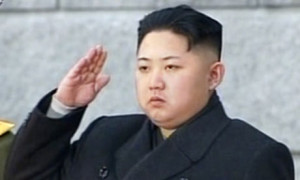 North Korea warns the world: no change in policy under Kim Jong-un
North Korea warns the world: no change in policy under Kim Jong-un
Defence commission sends uncompromising message to ‘foolish politicians including the puppet forces in South Korea’
(The Guardian) Hopes for a new era of engagement with North Korea have faded after the country’s powerful defence commission warned the world not to expect a change in policy under its new leader, Kim Jong-un.
The announcement broadcast by the state-run Korean Central News Agency on Friday, effectively dashed hopes that Kim might be ready to engage with South Korea and the wider international community.
20 December
Kim Jong-il dead: the official titles of North Korea’s Unique Leader
Kim Jong-il had one thing in common with Barack Obama – the title of Commander-in-Chief – but there the titular and any other similarities end.
(The Telegraph)The titles were developed by the Workers Party of Korea central committee and many were applied to his father Kim Il-sung, who ruled from 1948 to 1994.
The breadth of nomenclature reflects the omnipotent, all-action role in which North Korean’s dynastic leaders have been cast and the aura of reverence which the propaganda machine created around them
19 December
Kim Jong-il obituary
Kim Jong-il, who has died aged 69 after a heart attack, was the general secretary of the Workers’ party of Korea and head of the military in the Democratic People’s Republic of Korea (DPRK). He was one of the most reclusive and widely condemned national leaders of the late 20th and early 21st century, and left his country diplomatically isolated, economically broken and divided from South Korea.
Unsurprisingly for a man who went into mourning for three years after the death in 1994 of his own father, the legendary leader Kim Il-sung, and who in the first 30 years of his political career made no public statements, even to his own people, Kim’s career is riddled with claims, counter-claims, speculation and contradiction.
2010
10 October
North Korea’s heir apparent Kim Jong-un appears with father Kim Jong-il at military parade
Despite backing of key Workers’ Party officials, Kim Jong-un seems to be unpopular among North Korean citizens.
The public appearances of the Kims and the rare access granted to foreign media underscore Friday’s confirmation of Kim Jong-un as the future leader of North Korea. The Christian Science Monitor reports that Yang Hyong-sop, a member of the political bureau of the Workers’ Party, gave the first formal confirmation of Kim Jong Un’s succession, telling Associated Press Television that “Our people are honored to be led by the great president Kim Il-sung and the great general Kim Jong-il. Now we also have the honor of being led by General Kim Jong-un.
5 October
North Korea’s new dawn with Kim Jong-un
An heir to the North Korean dictatorship is anointed, and begins his rise. Where will Kim Jong-un lead his nation?
(CSM) … The new leader was a young man named Kim Jong-un, the choice of his father, ‘Dear Leader’ Kim Jong-il, who has survived longer than most people thought likely after a serious illness.
It was those intimations of mortality that added urgency to selecting an heir and to seeing that he gets the proper training to take over the government and country in a time of severe food shortages, seasonal flooding, and nonstop confrontation with North Korea’s historic foes, South Korea and the United States.
The easy part was the anointment of Kim Jong-un – Swiss-educated, reportedly a fan of US pro basketball, the youngest of Kim Jong-il’s three sons – first as a general and then as vice chairman of the military commission of the Workers’ Party at its annual conference on Sept. 28. Now he’s got to learn the job – and chart his course.

